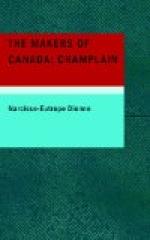On June 13th, Pont-Grave arrived at Quebec. Here he was questioned as to his authority, although he was treated with the respect and courtesy due to his age and character. Pont-Grave assured Champlain that the disputes between the two companies would be resolved in a friendly way, and that he had received news to this effect before he sailed from Honfleur. He then started for Three Rivers to join his clerks.
Some days after these events, a clerk named Rouvier, in the employ of de Caen, arrived with letters from Dolu, de Villemenon, and Guillaume de Caen, and left a copy of an order-in-council in favour of the old company. Champlain also received a letter from the king. The order-in-council granted permission to both companies to trade during the year 1621, provided that both should contribute equally towards the maintenance of the captains, soldiers, and the inhabitants of Quebec.
Foreseeing a conflict between de Caen and Pont-Grave, Champlain went to Tadousac, and advised de Caen to respect Pont-Grave’s authority. De Caen replied that he could not do so, as he had received authority privately from the king. Champlain therefore assured the commandment to Pont-Grave’s vessel, in order to protect his old friend, and thus it happened that this affair which threatened to produce serious consequences, was smoothed over through Champlain’s intervention. Pont-Grave then took possession of his vessel in the presence of de Caen, who offered no opposition, and a few days after they both returned to France.
De Caen had promised to send twenty-five men to Quebec, but he sent only eighteen. A certain quantity of stores was also brought to Quebec at this time by Jacques Halard, and a number of halberds, arquebuses, lances, and many barrels of powder, which were delivered in the presence of Jean Baptiste Varin, who had been sent by Guillaume de Caen, and Guers.
Father Georges Le Baillif also left for France during the autumn, as a delegate from the inhabitants of the settlement, who had prepared a memorandum of their grievances. This document was signed by Champlain, Father Jamet, Father Le Caron, Louis Hebert, Guillaume Couillard, Eustache Boulle, Pierre Reye, Olivier Le Tardif, J. Groux, Pierre Desportes, Nicholas and J.B. Guers. On his arrival in France, Father Le Baillif had an interview with the king, and placed the memorandum in question in His Majesty’s hands. The king admitted that the complaints were well founded, but at the same time he stated that it was impossible to grant all that was requested. The Huguenots were to retain their commercial liberty, and Champlain obtained some supplies, and his salary, which was formerly six hundred livres, was increased to twelve hundred.




